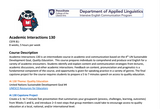
This resource was created by the Intensive English Communication Program (IECP) at Penn State.
- Subject:
- Language Education (ESL)
- Material Type:
- Full Course
- Syllabus
- Author:
- Nikki Mattson
- Date Added:
- 06/14/2023

This resource was created by the Intensive English Communication Program (IECP) at Penn State.

Academic Interactions 140 is an intermediate course in academic oral communication based on the 9th UN Sustainable Development Goal, Industry, Innovation and Infrastructure. This course prepares individuals to comprehend and produce oral English for a variety of academic encounters. Students identify and explain content and communication strategies from lectures, academic discussions, and other academic interactions. Feedback on content, pronunciation and pragmatics is a fundamental component of the course, and opportunity is given for speaking practice in a variety of genres. The final capstone project for the course requires students to prepare and deliver a 3- to 5- minute group presentation with one or two classmates about your engagement with an assigned challenge.
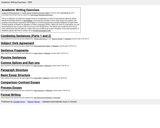
This is a collection of interactive Google Forms to complement a series of instructional videos by Shaun Macleod and Mark Roberts of SmrtEnglish. Each exercise includes a short video along with original, self-grading comprehension questions and analysis of contextual grammar examples designed for upper-level writing students of English for Speakers of Other Languages (ESOL). When you click on a link below, you will be prompted to save a copy of the form to your own Google Drive. This allows you to edit the form as you wish and ensures that the data you collect from your students go to your computer. If you have questions or feedback, please feel free to contact me at timothy.krause@pcc.edu.

During the Spring 2020 semester, I taught this wonderful group of ESL learners in the classroom and on Zoom after the pandemic hit. This OER is a collection of resources, teaching ideas, and student artifacts about that experience. I hope it helps you. If you have questions, or just want to brainstorm, feel free to email me at <mike.mutschelknaus@rctc.edu>.

Ever tried to play games with kids in English?It can be a fun treat!But what about when the child doesn’t even know how to say hello?In this case, trying to play games or sing songs can be just plain frustrating.It can’t be denied—teaching English to children is nothing like teaching adults! 5 Creative Ways to Teach Children Through Fun Activities1. Art ProjectsArt is a fantastic way to get your young students excited and interested in a variety of lessons to reinforce different vocabulary.The art project that goes with this lesson should either come at the end of the class or at the beginning of the following class after a brief review of the vocabulary. Students can draw pictures independently, but you should walk around the room and encourage them to talk to you about their work.2. Active GamesYou’ve probably already witnessed the awesome power of kinesthetic learning in the classroom, and active games can be a great way to get beginners up and moving. One of the best for beginners is Simon Says, or a variant thereof.Simon Says can be a very useful way to reinforce new vocabulary while also upping the energy. That’s why it’s a great choice either at the beginning or in the middle of a class.3. Singing SongsSongs are a fantastic mnemonic device for new vocabulary, and the Internet is a wealth of different song ideas. The best time to use a song is once the vocabulary has already been introduced. Some songs are simpler, ideal for using the same day or the same week that the vocabulary is introduced.4. LabelingLabeling can be a great way to remember new vocabulary. We already discussed a bit how labeling can be used during an art project, but you can also use labeling in a classroom or with photographs.If you’re trying to teach the names of different things in the classroom, tasking your students with creating labels for them can be a great way to get them up and moving—and speaking! Once the labels are created, be sure to laminate them. You can use them with all sorts of games, from treasure hunts to interactive matching or memory games.5. Educative PlayParticularly when your students are very young, educative play is a useful technique for teaching them without ever letting on! Students can be encouraged to play with one another in a variety of ways, either with board games or in a playroom or space, depending on the way your school is laid out. The idea with educative play is for teachers and assistants to participate in the play in English, asking questions that students can answer.

This is a presentation on Non verbal communication
1-What is communication?
2. What is Verbal and Non-verbal Communication?
3. Non-verbal Communication examples
4. Your body language may shape who you are
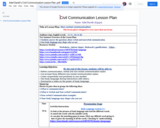
1-Students answer the questions about verbal and nonverbal communication.
2-Our body language may shape who we are.
By the end of this lesson, students will be able to:
• Define communication, verbal and non-verbal communication styles
• List at least three different non-verbal communication styles.
• Listen respectfully and positively to one another
• Use body language during interactions with others.
• Summarize a video on the power of body language.
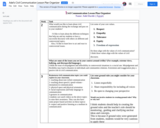
Civil Communication Lesson Plan Organizer
Name: Adel Dardir
Lesson Plan in weeks

This is a great lesson to use with pre-intermediate students. Though parts of it can be used with beginner students and as a review for more advanced students. The point of this lesson is to give students the ability to differentiate between similar-looking adjectives in English. When teaching adjectives ending in –ed and –ing you will cover words like boring and bored which tend to confuse new speakers. So if you find that one of your students is struggling with adjectives this is the right lesson to teach.If you want additional lesson plans and support, including teachers’ notes, be sure to register for a free Off2Class account.
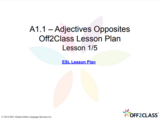
Lesson 1 introduces words that are commonly used when speaking and writing. Students will learn basic adjectives old/new and young/old.If you want additional lesson plans and support, including teachers’ notes, be sure to register for a free Off2Class account.
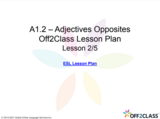
Secondly, lesson 2 introduces more complex adjectives like wide/narrow and fresh/stale. Students will have a chance to put the adjectives into use through various activities.If you want additional lesson plans and support, including teachers’ notes, be sure to register for a free Off2Class account.
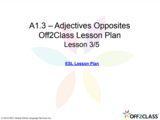
Lastly, lesson 3 focuses on more complex adjectives like dull/smart. Though these adjectives aren’t as common, they are still important for English learners to know.If you want additional lesson plans and support, including teachers’ notes, be sure to register for a free Off2Class account.

Suitable for beginner level students of English as a foreign language, beginner level. Students need to know how to compare adjectives and asking questions.
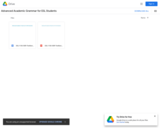
This textbook was created for an advanced academic grammar course for ESL students. By the end of the course, students will recognize and demonstrate the appropriate use of advanced grammar structures. To meet these outcomes, students will listen to aural language that includes the target structures, identify and edit grammar errors in written language, read and analyze texts that include the target grammar structures, and demonstrate the correct and appropriate use of target structures in written and spoken language.

This book has been created to provide a framework for building your skills in writing and critical thinking. It provides access to published samples from professional authors along with essay drafts from ESL students who have polished their skills in their respective writing courses.
The themes in the readings will give you a variety of topics to discuss with your classmates, which may inspire your own deeper thinking and writing. Overall, we hope that as you proceed through these chapters, you will build confidence and develop your voice in the classroom and beyond.

Software created by the Eylbid Strategic Partnership co-financed by the Erasmus+ program of the European Union (agreement no. 2019-1-ES01-KA201-064417). This video game can be used as a classroom activity with the following objectives:
to show that language brokering is a common practice that takes place in many schools around the world;
to promote a deeper understanding of what language brokering usually implies for young people;
to present some situations that teachers can analyze and discuss with their students from multiple perspectives as part of reflective practice;
to appreciate multilingualism and raise awareness among young people who translate and interpret in schools;
to provide young language brokers with tools and strategies to express how they feel about language brokering, and thus to take care of emotional health.
The videogame is multilingual and can be played in English, Catalan, German, Italian, and Spanish.
***
Programari creat per l'Associació Estratègica Eylbid cofinançada pel programa Erasmus+ de la Unió Europea (acord núm. 2019-1-ES01-KA201-064417). Es tracta d'un videojoc pensat perquè es faci servir com a activitat d'aula amb els objectius següents:
mostrar que la intermediació lingüística és una pràctica comuna que es duu a terme a moltes escoles arreu del món;
promoure una comprensió més profunda del que sol implicar la intermediació lingüística per part dels joves;
presentar algunes situacions que els docents puguin analitzar i discutir amb els seus alumnes des de múltiples perspectives com a part de la pràctica reflexiva;
apreciar el plurilingüisme i sensibilitzar els joves que tradueixen i interpreten a les escoles;
proporcionar als joves intermediaris lingüístics eines i estratègies per expressar com se senten en relació amb la intermediació lingüística i per tenir cura de la salut emocional.
El videojoc té diverses llengües disponibles: alemany, anglès, català, castellà i italià.

This lesson focuses on teaching students to understand the role of identity in the online marketplace and online advertising, and advertisers’ intent to manipulate consumers.

Tabelle zur Erklärung und Wiederholung des Akkusativs, inklusive Übung zum Präsens.
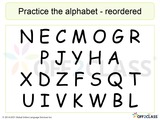
Lesson 2 allows students to practice what they learned prior. With your help, students can work on recognizing letters out of sequential order while learning additional vocabulary.If you want additional lesson plans and support, including teachers’ notes, be sure to register for a free Off2Class account.
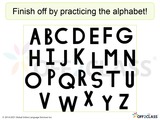
Lesson 3 introduces spelling exercises to challenge your student’s existing knowledge of each letter. It can also be used as a review lesson for more intermediate students.If you want additional lesson plans and support, including teachers’ notes, be sure to register for a free Off2Class account.